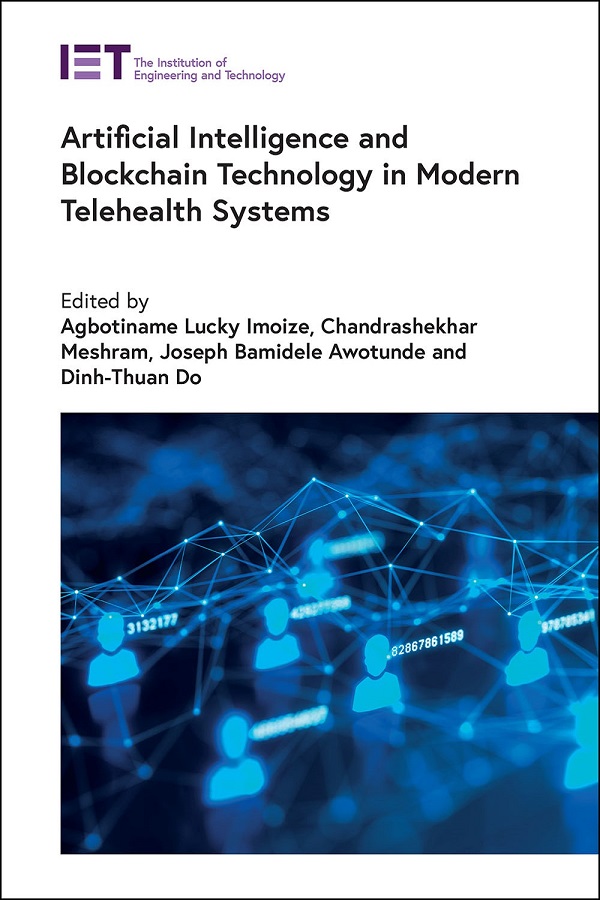- Agricultural Engineering and Technology
- Applied Physics
- Built Environment
- Computing and Networks
- Control, Robotics and Sensors
- Electrical Regulations
- Electromagnetics and Radar
- Energy Engineering
- Healthcare Technologies
- History and Management of Technology
- IET Codes and Guidance
- Manufacturing
- Materials, Circuits and Devices
- Model Forms
- Security
- Telecommunications
- Transportation

Artificial Intelligence and Blockchain Technology in Modern Telehealth Systems
Edited by Agbotiname Lucky Imoize, Chandrashekhar Meshram, Joseph Bamidele Awotunde, Dinh-Thuan Do
The expansion of telehealth services is enabling healthcare professionals to consult, diagnose, advise or perform tasks remotely, enabling them to treat more patients in their own homes or consult on cases on the other side of the world. The security of sensitive user information is critical to effective and efficient delivery of healthcare services. Artificial intelligence (AI) and blockchain technology are identified as key drivers of emerging telehealth systems, enabling efficient delivery of telehealth services to billions of patients globally. Specifically, AI facilitates the processing and analysis of complex telehealth data, and blockchain technology offers decentralised, transparent, traceable, reliable, trustful, and provable security to telehealth systems.
This edited book reviews security and privacy issues in traditional telehealth systems and focuses on the technical considerations, potential opportunities and critical challenges currently inhibiting the adoption of AI and blockchain in telehealth systems. The book presents case studies which highlight critical lessons and considers the prospects and societal benefits of AI and blockchain, while providing suitable recommendations for designing future AI and blockchain-based telehealth systems.
Artificial Intelligence and Blockchain Technology in Modern Telehealth Systems is suited to researchers and computer engineers working in healthcare delivery, telemedicine, cybersecurity, data science, AI/ML and those in related fields.
About the Editors
Agbotiname Lucky Imoize is a lecturer in the Department of Electrical and Electronics Engineering at the University of Lagos, Nigeria. His research interests cover the fields of 6G wireless communication, wireless security systems, and artificial intelligence. He is a Fulbright research fellow, the vice chair of the IEEE Communication Society, Nigeria chapter, and a registered engineer with the Council for the Regulation of Engineering in Nigeria (COREN). He is a senior member of the IEEE.
Chandrashekhar Meshram is an assistant professor in the Department of Post Graduate Studies and Research in Mathematics, Jaywanti Haksar Government Post Graduate College, Raja Shankar Shah University, India. His research interests include cryptography and its applications, neural networks, the IoT, wireless sensor networks (WSNs), medical information systems, ad-hoc networks, number theory, fuzzy theory, time series analysis, climate change, mathematical modeling, and chaos theory. He has published over 150 scientific articles in international journals and conferences.
Joseph Bamidele Awotunde is a lecturer with the Computer Science Department, University of Ilorin, Nigeria. He has authored or co-authored over 100 articles, 60 book chapters and over 40 conference proceedings. His research interests include information security, cybersecurity, bioinformatics, artificial intelligence, the internet of medical things, wireless body sensor networks, telemedicine, m-health/e-health, medical imaging, software engineering, and biometrics. He holds a PhD degree in computer science from the University of Ilorin, Nigeria.
Dinh-Thuan Do is an assistant professor of computer and electrical engineering in the School of Engineering at the University of Mount Union, USA. His research interests include signal processing in wireless communications networks, non-orthogonal multiple access, full-duplex transmission, and reconfigurable intelligent surfaces (RIS). He was a recipient of the Golden Globe Award from the Vietnamese Ministry of Science and Technology in 2015 (Top ten excellent scientists nationwide). He is a senior member of the IEEE.
Publication Year: 2023
Pages: 704
ISBN-13: 978-1-83953-863-6
Format: HBK
Editors: Agbotiname Lucky Imoize, Chandrashekhar Meshram, Joseph Bamidele Awotunde, Dinh-Thuan Do
